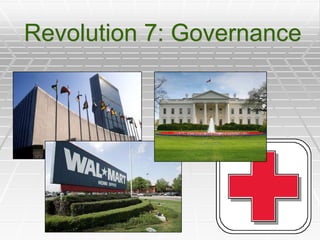
Governance
- 2. Definitions State Nation Empire Territory Government Governance Sovereignty
- 3. Governance We develop social organizations, struct ures and processes to govern ourselves and provide for our basic needs.
- 4. Social Contract We grant “consent” to authority (government) and in return we receive the benefits of the civil society.
- 5. Foundations of Government (Civil Society) Provide security, order, and protection from internal and external threats Administration of justice (legal system and political duties) Regulation of trade, labor and industry (economic) Provide for the general welfare of citizens (education, public utilities, care for the poor)
- 6. Governance Over the last 100 years, the States (national governments) have been considered to have legitimate rights to this power (and responsibility).
- 7. Criteria of a State Has space or territory which has internationally recognized boundaries Has sovereignty Has external recognition Has people who live there on an ongoing basic Has economic activity and an organized economy. A country regulates foreign and domestic trade and issues money Has the power of social engineering, such as education Has a government which provides public services and police power
- 8. Colonial Period Between the 1500’s and 1800’s, the world was dominated by European empires; where European monarchs ruled and governed much of the world.
- 9. Colonial Period Colonial Map
- 10. Modern Nation-State System Several hundred years ago: Slow transformation Move to multiple States Currently: 193 members of the United Nations US State Department recognizes 195 independent countries At least 20 other places that are usually considered States
- 11. What Places are Not States? Taiwan Scotland Palestine Puerto Rico Greenland
- 12. Nation States Nation states are combination entities Political entity Sovereignty Geographic region Cultural or ethnic identity Nation states align these three elements Nation states are the current dominant political structure in the world
- 14. The Newest Nation-States Photo credit: Joe Burgess, NYT
- 15. Changes to the Nation-State System Today, the world is experiencing another major transformation: Sovereignty of nation states is being challenged Other powerful players are threatening the basic role of governments. Multinational corporations Non-government organizations International organizations, alliances and agreements
- 16. Changes to the Nation-State System Basic functions of governance are shifting Move from governments to other entities These players impact security, the legal and economic systems, and provide basic welfare support.
- 17. Changes to the Nation-State System National governments have not been successful Failed in providing for basic needs Technology is allowing other to step in
- 18. Changes to the Nation-State System Let’s take a closer look at each of these new players and their impact on governance Multinational corporations social responsibility NGOs and the civil society International organizations International alliances, treaties, and international agreements
- 19. Multinational Corporations Definition International power Tax revenue Employment Economic activity Examples Ford Motor Company Walmart Walmart Mexico and Walmart Numbers Micro-multinationals
- 20. Multinational Corporations Social Responsibility CSR is a concept whereby organizations consider the interests of society by taking responsibility for the impacts of their actions on customers, employers, shar eholders, communities and the environment in all aspects of their operations.
- 21. Multinational Corporations Social Responsibility CSR Extends beyond statutory obligations Voluntarily taking further steps to improve: Quality of life for employees Improving the local community and Society at large.
- 22. Social Responsibility Examples Starbucks Starbucks CSR Gap Gap CSR
- 23. Non-Government Organizations NGOs NGOs are: legally recognized entities created by private persons or organizations Not governments or government agents Focused on a particular topic or set of issues
- 24. NGOs NGOs are outspoken advocates for: Human rights Environmental issues Social programs Women’s rights Many more topics…. NGOs are often the most effective voices for the concerns of ordinary people in the international arena.
- 25. NGOs NGO Directory NGO examples Amnesty International Arab Association for Human Rights Desert Research Foundation of Namibia
- 26. International Organizations An international organization is, by definition, any organization with international membership, scope, or presence. In common usage it means an intergovernmental organization (IGO) United Nations (UN) European Union (EU) World Trade Organization (WTO)
- 27. International Organizations Alliances and Agreements International organization directory International organization examples African Union Helsinki Commission League of Arab States NAFTA NATO OPEC International Civil Aviation Organization
- 28. Challenges for the Future “The need for strategic leadership” Innovative strategic partnerships Government, business, NGOs, IOs Strategic Vision These entities will need to work together Creativity Problems are too complex to solve unilaterally